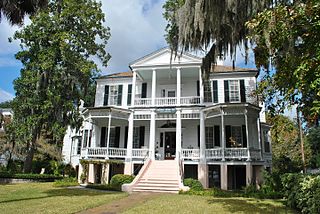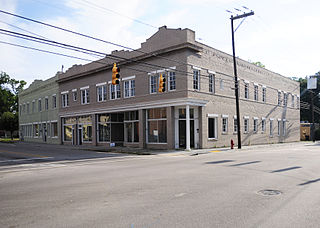
Colleton County is a county in the Lowcountry region of the U.S. state of South Carolina. As of the 2020 census, the population was 38,604. Its county seat is Walterboro. The county is named after Sir John Colleton, 1st Baronet, one of the eight Lords Proprietor of the Province of Carolina. After two previous incarnations, the current Colleton County was created in 1800.

Walterboro is a city in Colleton County, South Carolina, United States. The city's population was 5,398 at the 2010 census. It is the county seat of Colleton County. Walterboro is located 48 miles (77 km) west of Charleston and is located near the ACE Basin region in the South Carolina Lowcountry.

Ravenwood Plantation is a historic rice plantation, built in 1850 near Neyles in Colleton County, South Carolina.

The Kingstree Historic District contains forty-eight properties situated along Main Street, Academy Street, and Hampton Street in the commercial area of downtown Kingstree, South Carolina. The district includes the courthouse, public library, railroad station, and numerous commercial buildings. The district is a fine collection of nineteenth-century vernacular commercial architecture. Details such as arched doorways and windows, cast-iron columns and pilasters, decorative or corbelled brickwork and pressed tin interior ceilings are present on most of the district's buildings. The Williamsburg County Courthouse, built ca. 1823, and designed by Robert Mills, is a fine example of Roman neoclassical design with its raised first floor, pediment with lunette, and Doric columns. In 1953-54 the courthouse underwent substantial remodeling on the exterior and interior, though it still reflects much of Mill's original design. With the exception of the courthouse, most of the buildings in the district were built between 1900 and 1920 when Kingstree enjoyed prosperity as a retail and tobacco marketing center of Williamsburg County. The majority of the buildings in the district are a visible record of this twenty-year growth and the historic fabric of the area remains substantially intact. The Kingstree Historic District was listed in the National Register of Historic Places June 28, 1982.

The Old Campus District, University of South Carolina, is a historic district centered on The Horseshoe on the main campus of the University of South Carolina in Columbia, South Carolina. On June 5, 1970, it was listed in the National Register of Historic Places. On April 19, 1996 MTV Unplugged filmed Hootie & the Blowfish's concert on The Horseshoe before the release of their second album Fairweather Johnson.

The Barnwell-Gough House, also known as Old Barnwell House, is a house built in Beaufort, South Carolina in 1789.

John A. Cuthbert House is a house built in 1811 in Beaufort. It was listed on the National Register of Historic Places in 1972.

Edward Brickell White, also known as E. B. White, was an architect in the United States. He was known for his Gothic Revival architecture and his use of Roman and Greek designs.
Merrick Ezra Carn (1808–1862) was the 48th Lieutenant Governor of South Carolina from 1858 to 1860 serving under Governor William Henry Gist. Merrick signed the SC Ordinance of Secession in December 1860 at Charleston.

The Fripp-Fishburne House is a historic building in Walterboro, South Carolina, United States. Built in 1889, it has been renovated several times and currently serves as a private residence.

Pendleton Historic District in Pendleton, South Carolina is a historic district which is located mostly in Anderson County, South Carolina and partly in Pickens County, South Carolina. The district was listed on the National Register of Historic Places in 1970. The historic district includes the town of Pendleton and its immediate surroundings plus a large tract west towards Lake Hartwell to include the Hopewell Keowee Monument and the Treaty Oak Monument. The entire historic district covers an area of over 6,300 acres (25 km2).

Anderson Downtown Historic District in Anderson, South Carolina, originally built in the late 19th century, is a historic district that was listed on the National Register of Historic Places in 1979.

Edward Culliatt Jones was an American architect from Charleston, South Carolina. A number of his works are listed on the U.S. National Register of Historic Places, and two are further designated as U.S. National Historic Landmarks. His works include the following :

The Colleton County Courthouse was built in 1820. It was listed on the National Register of Historic Places in 1971. The building is located corner of Jeffries and Hampton Streets in Walterboro, South Carolina. The building was put on the register as an example of Greek Revival architecture and also due to its historical significance, since the first meeting on nullification was held in the building in 1828.

Walterboro Library Society Building is a historic library building located at Walterboro, Colleton County, South Carolina. It was built in 1820, and is a small, white, Federal style frame building with a side-gabled roof. The front façade features a Palladian-style door surround capped by a fanlight. The building is occupied by the Colleton County Historical Society. When Walterboro was incorporated in 1826, the town boundaries were established as "3/4 of a mile in every direction from the Walterboro Library."

Old Colleton County Jail is a historic library building located at Walterboro, Colleton County, South Carolina. It was built in 1856, and is a stuccoed brick building in the Gothic Revival style. The building was designed by noted Charleston architects, Edward C. Jones and Francis D. Lee. The jail in part resembles a miniature, fortified castle. The front façade has crenellated parapets, turret-like structures at either corner, and a massive central tower with a large lancet window above the main entrance.

Hotel Albert Commercial Block, also known as the Shoppes at the Albert House, is a historic hotel building located at Walterboro, Colleton County, South Carolina. The complex was built in 1912, and consists of four two-story brick structures. It was operated as a hotel until 1960, after which it housed apartments and various commercial enterprises. They buildings were restored in 1995.

Hickory Valley Historic District is a national historic district located at Walterboro, Colleton County, South Carolina. The district encompasses 16 contributing buildings in Walterboro. The majority of the properties in the district are residences constructed between 1821 and 1929 which includes a concentration of early homes dating from Walterboro's heyday as a pineland resort village for lowcountry planters. The architectural styles in the district include Federal, Greek Revival, Victorian carpenter, Neo-Classical and Federal Revival. The district is important historically for its associations with Walterboro's founders as well as with several generations of prominent Walterboro families.

South Street–South Church Street Historic District is a national historic district located at Union, Union County, South Carolina. The district encompasses 78 contributing buildings in a primarily residential section of Union. The houses were built between about 1850 to about 1930, with the majority dating from about 1850 to about 1915. The district includes many large-frame Queen Anne inspired houses built about 1880–1910. Also in the district are Neo-Classical, Gothic Revival, Colonial Revival, Tudor Revival, American Foursquare, and Bungalow style dwellings. The district includes the first Carnegie Library established in South Carolina.






















